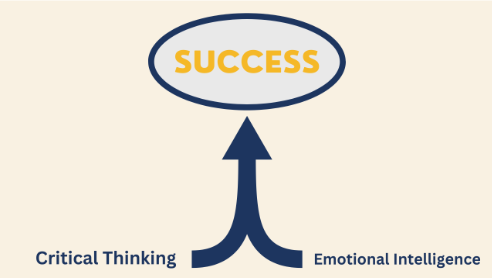
Bush School of Public Service & Administration
The Power of Critical Thinking: Balancing Facts, Emotions, and Perspectives
The Value of Listening in Decision-Making
The experiences I’ve had in both the Corps of Cadets and graduate school have taught me that critical thinking goes beyond memorizing facts. Whether resolving conflicts or analyzing literature, the most effective decision-making requires understanding not only the facts but also the people involved. Taking the time to listen to others’ emotions, opinions, and perspectives leads to better, more thoughtful solutions. Critical thinking, in essence, is about engaging with complexity and considering the full picture before making decisions.
Applying Critical Thinking in Conflict Resolution
While in the Corps of Cadets, I frequently relied on my critical thinking skills to solve problems, particularly when conflicts arose among peers. I quickly realized that the key to resolving disputes wasn’t always about finding a simple solution, but about understanding the various perspectives involved. By taking a neutral stance, I was able to listen carefully to both sides of the argument, ensuring that each person’s emotions and opinions were acknowledged. In many cases, individuals weren’t necessarily seeking a resolution to the conflict itself, but rather validation of their feelings and viewpoints. This process required much more time and effort than simply hearing one side and making a decision based on that. However, it was through this method of listening and engaging with all parties that I was able to help facilitate compromise and understanding. These experiences taught me that effective conflict resolution requires a balance of reason and empathy, where critical thinking involves not only analyzing facts but also recognizing and addressing the emotional undercurrents that influence decision-making.
Critical Thinking in Graduate School
When I entered graduate school at the Bush School of Public Service in Government, I found that critical thinking was required at a much higher level. My undergraduate education had emphasized memorization—whether it was scientific names or the identification of species. While important, these skills focused solely on memorization to pass exams. Graduate school, on the other hand, demanded deeper analysis and engagement. The classes taught us more than just memorization for exams. Our instructors encouraged us to read literature and engage in discussions about the material with our classmates. These discussions taught me how to analyze not only the content but also the diverse viewpoints of my peers. I realized that the different perspectives and experiences of my classmates played a significant role in how they interpreted the readings and approached problems. For example, during an environmental policy class, our class had a heated discussion about oil drilling. The students who majored in Business had a different perspective on the issue than those of us from the Public Service field, which led to this disagreement. Through our dialogue, the Business students were able to better understand the concerns we had about environmental impact, while we gained insight into their focus on economic growth and job creation. Although we couldn’t reach a consensus, the conversation allowed us to appreciate the logical foundations behind each other’s views. This experience expanded my understanding of critical thinking, illustrating how people’s personal experiences and emotions can shape their perspectives and, in turn, influence their decisions.
Balancing Logic and Empathy in Critical Thinking
The development of critical thinking has been an essential part of both my academic and personal growth. From navigating conflicts in the Corps of Cadets to engaging in thoughtful discussions at graduate school, I have learned that critical thinking is more than just processing; it's about understanding the variation of human perspectives and emotions. Whether mediating a disagreement or analyzing a complex policy issue, the ability to listen, empathize, and think critically has allowed me to make better decisions. These experiences have shown me that effective problem-solving is rooted in the careful consideration of both logic and the human element, and this balance is key to addressing the challenges we face in both personal and professional settings.

Combining Critical Thinking with Emotional Intelligence sets me up for success every time
HeadScratchers, LLC. (2023, April 25). Critical Thinking + Emotional Intelligence. Www.linkedin.com. https://www.linkedin.com/pulse/critical-thinking-emotional-intelligence-headscratchers-llc